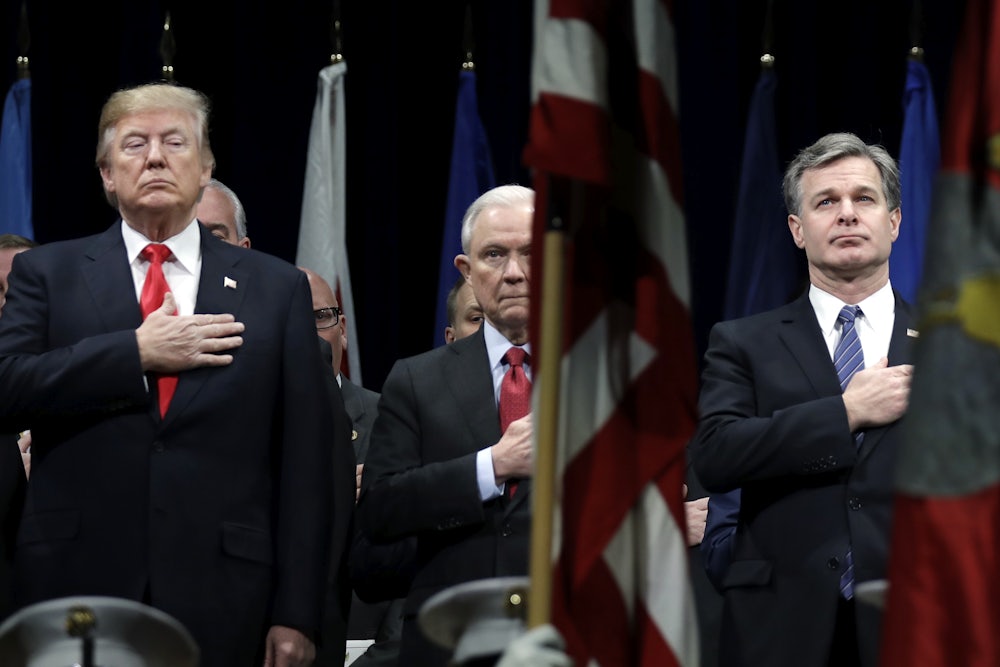In announcing the release of a declassified four-page memo prepared by the House Intelligence Committee, which he chairs, Representative Devin Nunes said, “The committee has discovered serious violations of the public trust, and the American people have a right to know when officials in crucial institutions are abusing their authority for political purposes. Our intelligence and law enforcement agencies exist to defend the American people, not to be exploited to target one group on behalf of another.”
As The New Republic’s Matt Ford explains, the memo does not support Nunes’s allegations, let alone justify the hype that preceded it from Fox News and other right-wing outlets. But its release on Friday is still an important event: the latest skirmish in the war that Trump and his allies in Congress are waging against the FBI.
FBI Director Christopher Wray had told the White House he opposed making the memo public, and the FBI released a statement saying it has “grave concerns about material omissions of fact that fundamentally impact the memo’s accuracy.” But Trump had other ideas. Early Friday morning, he tweeted an attack on the FBI and the Department of Justice:
The top Leadership and Investigators of the FBI and the Justice Department have politicized the sacred investigative process in favor of Democrats and against Republicans - something which would have been unthinkable just a short time ago. Rank & File are great people!
— Donald J. Trump (@realDonaldTrump) February 2, 2018
Hours later, Trump revealed that he had approved the memo’s release, saying, “I think it’s a disgrace what’s going on in this country.”
WATCH: "I think it's a disgrace what's going on in this country. The memo was sent to Congress -- it was declassified," Pres. Trump approves release of classified GOP memo: https://t.co/sIbOKTEwrG pic.twitter.com/aaGVApXW7C
— CBS News (@CBSNews) February 2, 2018
It’s unprecedented for any president to attack the FBI so brazenly, but it’s especially unusual for a Republican president to accuse the FBI, one of the most conservative of federal agencies, of being anti-Republican. This is, of course, a deliberate strategy to undermine the investigation against him, which New York Times columnist Michelle Goldberg on Thursday compared to Republicans’ attacks on climate science and the mainstream media. “And now, to protect Trump, the right has expanded its war on empiricism to that most conservative of institutions, the F.B.I.,” Goldberg wrote.
But as Goldberg implies, the campaign against the FBI isn’t limited to the president. Much of his party shares his view. Arizona Congressman Paul Gosar, for example, released an extraordinary statement saying, “The House Permanent Select Committee on Intelligence memorandum on the FBI abuse of FISA warrants and targeting of a sitting president is not just evidence of incompetence but clear and convincing evidence of treason.”
My full statement on the declassified memo: pic.twitter.com/eRo6ugpWQ9
— Rep. Paul Gosar, DDS (@RepGosar) February 2, 2018
Not all Republicans agree. Arizona Senator John McCain and South Carolina Congressman Trey Gowdy both released statements taking issue with the right’s prevailing view of the memo (Gowdy more cautiously than McCain):
The latest attacks on the FBI and Department of Justice serve no American interests – no party’s, no president’s, only Putin’s. https://t.co/6dsbcBIla6
— John McCain (@SenJohnMcCain) February 2, 2018
While this memo raises serious concerns with the FISA process, I have been and remain confident in the overwhelming majority of the men and women serving at the FBI and DOJ.
— Trey Gowdy (@TGowdySC) February 2, 2018
Trump claims the FBI has “politicized the sacred investigative process in favor of Democrats and against Republicans,” but historically, the FBI has been a very conservative, and often reactionary, institution. The first and longest-serving head of the agency, J. Edgar Hoover, was notorious for his right-wing politics, often using the agency to target Civil Rights leaders like Martin Luther King and other political radicals. The FBI reformed itself, but remains conservative in orientation. Every non-interim director of the agency has been a Republican, even those appointed by Democratic presidents.
As the HuffPost notes, “The key law enforcement figures in what President Donald Trump and his allies have characterized as a ‘deep state’ conspiracy against him are not lefties or even Democrats: They are Republicans. And Trump picked a number of them himself.” Special counsel Robert Mueller, Deputy Attorney General Rod Rosenstein, and current FBI head Christopher Wray are all Republicans. Former FBI Director James Comey was a Republican until a few years ago.
During the 2016 election, the FBI was investigating both Hillary Clinton and Trump’s campaign. But the public only knew about the Clinton investigation, both through reports and leaks. As Spencer Ackerman reported in The Guardian in 2016, “Deep antipathy to Hillary Clinton exists within the FBI, multiple bureau sources have told the Guardian, spurring a rapid series of leaks damaging to her campaign just days before the election.” The FBI kept a tight lid on the investigation into the Trump campaign. This hardly suggests an FBI bias.
Waging war against the FBI might seem a risky proposition for a Republican president, but here as elsewhere, Trump is proving that partisanship triumphs over older allegiances. As HuffPost reports, there has been a steep decline in Republicans saying they have faith in the FBI in the last two years. Only 10 percent of Republicans say they have a “great deal” of trust in the FBI, versus 30 percent of Democrats. In this topsy-turvy world under Trump, hating the FBI could soon be a core part of Republican identity.
